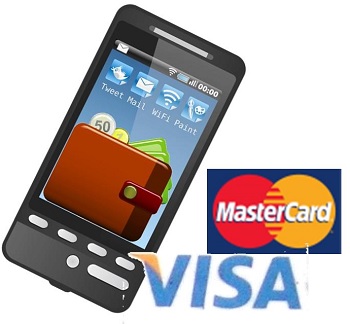Visa announces the launch of its new Token Service
Visa has announced that it has launched its Token Service. The service is meant to drive innovation in the mobile commerce field while also introducing more security to digital payments. The service replaces valuable financial information with digital tokens, which have the ability to authenticate mobile transactions. Security is one of the most significant challenges facing the mobile commerce space currently and Visa has been taking steps to address this issue in recent years.
Storing financial information on a mobile device can be risky
When it comes to mobile payments, a consumer’s financial information is often stored on a mobile device. This information can be stored on a digital wallet platform or a payment service. The problem with this is that this information can be accessed whenever such a platform is exploited. Malicious groups often target mobile commerce services in order to obtain such information. Visa’s Token Service may resolve this issue by removing the need to store financial information on a mobile device completely.
Token Service removes the need to store financial information
 The Token Service is designed to replace a consumer’s financial information with digital tokens. These tokens do not contain a consumer’s information, but can still be used to facilitate a mobile payment. The tokens can be stored by merchants and not just consumers as well. This means that consumers can shop at their favorite online stores and make purchases from their mobile devices without having to input any valuable financial information.
The Token Service is designed to replace a consumer’s financial information with digital tokens. These tokens do not contain a consumer’s information, but can still be used to facilitate a mobile payment. The tokens can be stored by merchants and not just consumers as well. This means that consumers can shop at their favorite online stores and make purchases from their mobile devices without having to input any valuable financial information.
New service is meant to bring more convenience and security to the mobile commerce field
Visa’s Token Service will only be available in the U.S. until early 2015. Next year, Visa plans to introduce the service to several other countries where mobile and e-commerce are thriving. The service is designed to further improve the attractiveness of mobile shopping and payments by highlighting security and convenience. Mobile commerce has thrived due to its convenient nature, but there are relatively few security solutions that have made consumers comfortable with paying for products from their mobile devices.
As mobile commerce continues to thrive, digital wallets are becoming more important
Mobile wallets may soon be the way of the future. A growing number of applications that are designed specifically to store financial information and data provided by retailers are emerging in the mobile space. These apps are thriving in the popularity of mobile commerce, finding support among consumers that want to pay for products using nothing more than their smartphones and tablets. For Visa and MasterCard, the mobile wallet holds a great deal of promise, but both companies are finding it difficult to engage mobile consumers effectively.
Visa is trying to form a direct connection with consumers
Both Visa and MasterCard have their own mobile commerce services on offer. Visa’s Checkout service was introduced in July and is meant to replace the company’s old digital wallet. Using the service, consumers will be able to pay for goods and services using data on their mobile devices. Visa is using its marketing clout to promote this new mobile wallet, but whether or not the service will prove popular among consumers has yet to be seen. Visa is currently struggling to form a direct connection with consumers, having focused so heavily on its relationship with businesses.
MasterCard wants businesses to integrate its digital wallet
 MasterCard is offering a similar service with its MasterPass platform. The MasterPass application is meant to help make e-commerce more convenient to consumers, but MasterCard is not likely to try to form a direct connection with people using the app. Instead, the company is likely to continue focusing its efforts on providing services to its business partners, allowing them to connect with mobile consumers more dynamically. For MasterCard, creating something new is not the priority. The company wants to see its MasterPass service integrated into existing platforms.
MasterCard is offering a similar service with its MasterPass platform. The MasterPass application is meant to help make e-commerce more convenient to consumers, but MasterCard is not likely to try to form a direct connection with people using the app. Instead, the company is likely to continue focusing its efforts on providing services to its business partners, allowing them to connect with mobile consumers more dynamically. For MasterCard, creating something new is not the priority. The company wants to see its MasterPass service integrated into existing platforms.
Mobile wallets could be the key to omnichannel engagement
Merchants are working to adapt to the idea of omnichannel engagement. In a world where mobile technology has become so prominent, this has proven to be a difficult task. Connecting with mobile consumers is a complicated issue, but mobile wallets may be the key to success in this endeavor. In the coming years, more people are likely to be engaged in mobile commerce, and they will need digital wallets to make their experiences enjoyable.
 The Token Service is designed to replace a consumer’s financial information with digital tokens. These tokens do not contain a consumer’s information, but can still be used to facilitate a mobile payment. The tokens can be stored by merchants and not just consumers as well. This means that consumers can shop at their favorite online stores and make purchases from their mobile devices without having to input any valuable financial information.
The Token Service is designed to replace a consumer’s financial information with digital tokens. These tokens do not contain a consumer’s information, but can still be used to facilitate a mobile payment. The tokens can be stored by merchants and not just consumers as well. This means that consumers can shop at their favorite online stores and make purchases from their mobile devices without having to input any valuable financial information.
 MasterCard is offering a similar service with its MasterPass platform. The MasterPass application is meant to help make e-commerce more convenient to consumers, but MasterCard is not likely to try to form a direct connection with people using the app. Instead, the company is likely to continue focusing its efforts on providing services to its business partners, allowing them to connect with mobile consumers more dynamically. For MasterCard, creating something new is not the priority. The company wants to see its MasterPass service integrated into existing platforms.
MasterCard is offering a similar service with its MasterPass platform. The MasterPass application is meant to help make e-commerce more convenient to consumers, but MasterCard is not likely to try to form a direct connection with people using the app. Instead, the company is likely to continue focusing its efforts on providing services to its business partners, allowing them to connect with mobile consumers more dynamically. For MasterCard, creating something new is not the priority. The company wants to see its MasterPass service integrated into existing platforms.